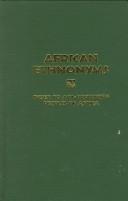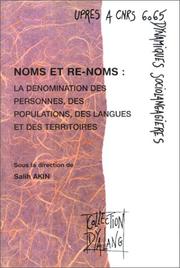| Listing 1 - 10 of 11 | << page >> |
Sort by
|
Book
Year: 1979 Publisher: Paris : Ecole des hautes études en sciences sociales, Centre d'études africaines,
Abstract | Keywords | Export | Availability | Bookmark
 Loading...
Loading...Choose an application
- Reference Manager
- EndNote
- RefWorks (Direct export to RefWorks)
Names, Ethnological --- Benin --- Languages
Book
ISBN: 9789004685895 9789004686601 Year: 2024 Publisher: Leiden ;Boston Brill
Abstract | Keywords | Export | Availability | Bookmark
 Loading...
Loading...Choose an application
- Reference Manager
- EndNote
- RefWorks (Direct export to RefWorks)
No people is nameless, and lists of words are as old as writing systems. And yet, both subjects can appear unpromising to historians. This volume shows the contrary by examining the various meanings and functions of ethnonyms in Late Antiquity: added to catalogues of provinces, they reflect the political messages and the regulating power of the imperial bureaucracy; included in schoolbooks, they mirror educational practices and reveal the geographical and ethnic landscapes taught at school; placed on a map, they help make sense of the world in times of transition.
Names, Ethnological. --- Names, Ethnological --- Lists --- Names, Latin --- Ethnonymes --- Aspect politique
Book
ISBN: 3700103670 9783700103677 Year: 1987 Volume: 371 9 Publisher: Wien : Verlag der Österreichischen Akademie der Wissenschaften,
Abstract | Keywords | Export | Availability | Bookmark
 Loading...
Loading...Choose an application
- Reference Manager
- EndNote
- RefWorks (Direct export to RefWorks)
Names, Ethnological --- Noms ethniques --- Iranian languages --- Names, Ethnological. --- Ethnonymes --- Persan (langue) --- Ethnographischer Name. --- Altpersisch. --- Skythen. --- Noms. --- Etymology --- Names. --- History. --- Étymologie --- Iran. --- History

ISBN: 0783815328 Year: 1996 Publisher: New York (N.Y.) : Hall,
Abstract | Keywords | Export | Availability | Bookmark
 Loading...
Loading...Choose an application
- Reference Manager
- EndNote
- RefWorks (Direct export to RefWorks)
Art, African --- Names, Ethnological --- Art africain --- Noms ethniques --- Dictionaries --- Dictionnaires --- Art, Black --- Dictionaries.
Book
Year: 1954 Volume: 28, fasc.2 Publisher: Bruxelles : Institut royal colonial belge,
Abstract | Keywords | Export | Availability | Bookmark
 Loading...
Loading...Choose an application
- Reference Manager
- EndNote
- RefWorks (Direct export to RefWorks)
Ethnology --- Names, African --- Names, Ethnological --- Anthropologie sociale et culturelle --- Noms africains --- Noms ethniques
Book
ISBN: 9780415559362 0415559367 9780203861387 0203861388 Year: 2010 Publisher: London : Routledge,
Abstract | Keywords | Export | Availability | Bookmark
 Loading...
Loading...Choose an application
- Reference Manager
- EndNote
- RefWorks (Direct export to RefWorks)
Communication and culture --- Names, Ethnological --- Communication et culture --- Noms ethniques --- Asia --- Asie --- Ethnic relations. --- Relations interethniques
Book
Year: 1970 Publisher: Luanda : O Instituto,
Abstract | Keywords | Export | Availability | Bookmark
 Loading...
Loading...Choose an application
- Reference Manager
- EndNote
- RefWorks (Direct export to RefWorks)
Ethnology --- Names, Ethnological --- Anthropologie sociale et culturelle --- Maps --- Angola --- Languages --- Maps.
Book
ISBN: 9781845454135 9781845451651 1845454138 9780857458490 0857458493 Year: 2009 Publisher: New York : Berghahn Books,
Abstract | Keywords | Export | Availability | Bookmark
 Loading...
Loading...Choose an application
- Reference Manager
- EndNote
- RefWorks (Direct export to RefWorks)
On the surface, naming is simply a way to classify people and their environments. The premise of this study is that it is much more - a form of social control, a political activity, a key to identity maintenance and transformation. Governments legislate and regulate naming; people fight to take, keep, or change their names. A name change can indicate subjugation or liberation, depending on the circumstances. But it always signifies a change in power relations. Since the late 1970s, the author has looked at naming and renaming, cross-culturally and internationally, with particular attention
Names, Inuit --- Inuit --- Noms inuit --- Inuits --- Social life and customs. --- Government relations. --- Moeurs et coutumes --- Relations avec l'Etat --- Nunavut --- Names, Geographical --- Names, Ethnological --- Political aspects
Book
ISBN: 2738459595 9782738459596 Year: 1998 Volume: *9 Publisher: Paris : L'Harmattan,
Abstract | Keywords | Export | Availability | Bookmark
 Loading...
Loading...Choose an application
- Reference Manager
- EndNote
- RefWorks (Direct export to RefWorks)
Kanyok (African people) --- Kanyok (Afrikaans volk) --- Kanyok (Peuple africain) --- Bantu languages --- Bantu-speaking peoples --- Names, Ethnological --- Langues bantoues --- Bantous --- Kanyok (Peuple d'Afrique) --- Noms ethniques --- Etymology. --- Cultural assimilation --- History. --- Ethnic identity --- Etymologie --- Acculturation --- Histoire --- Identité ethnique --- Names, Bantu --- Etymology --- Names. --- Cultural assimilation. --- Kanyok (African people). --- Identité ethnique --- Kasai River Valley (Angola and Congo) --- History --- Africa [Eastern ] --- Names [Ethnological ]

ISBN: 2877752720 9782877752725 Year: 2000 Volume: 272 Publisher: [Mont-Saint-Aignan]: Publications de l'Université de Rouen,
Abstract | Keywords | Export | Availability | Bookmark
 Loading...
Loading...Choose an application
- Reference Manager
- EndNote
- RefWorks (Direct export to RefWorks)
Linguistic change --- Sociolinguistics --- Toponymy --- Language and languages --- Names, Ethnological --- Names, Personal --- Changement linguistique --- Sociolinguistique --- Toponymie --- Variation (Linguistique) --- Noms ethniques --- Noms de personnes --- Social aspects --- Variation --- Aspect social --- Lexicology. Semantics --- Names --- Ethnic conflict --- Political aspects --- Toponymy. --- Language and languages - Political aspects
| Listing 1 - 10 of 11 | << page >> |
Sort by
|

 Search
Search Feedback
Feedback About UniCat
About UniCat  Help
Help News
News